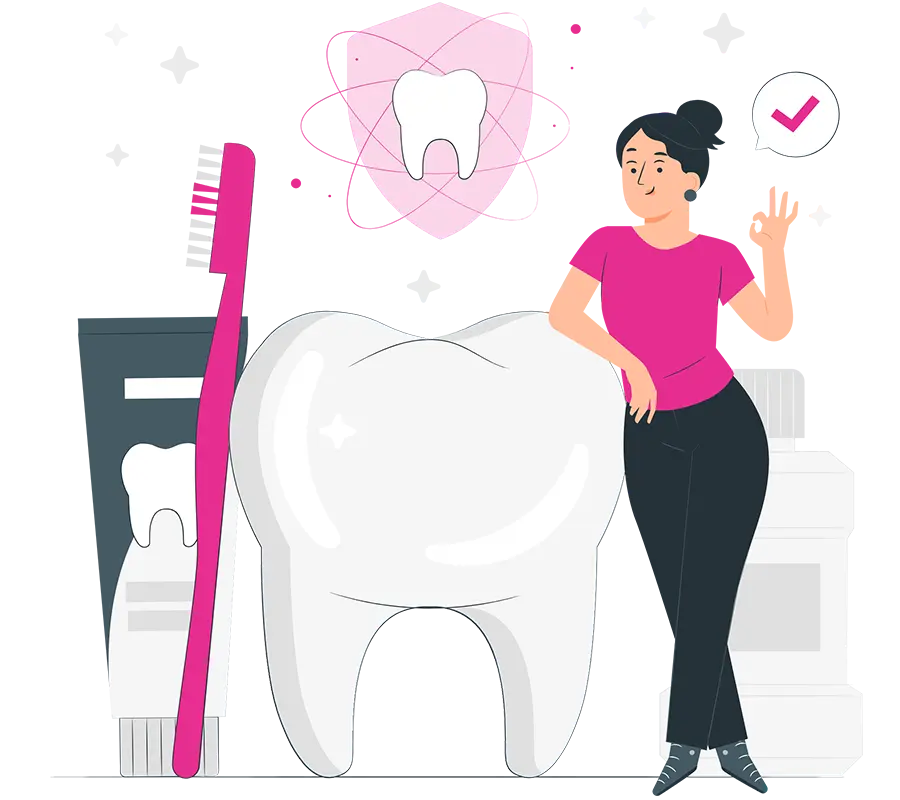Why don’t you open your dental clinic? Maybe you don’t have a road map or strange thoughts hinder your way!
But you know what, nearly half of all Americans struggle with gum disease, searching for an expert dentist just like you!
In this article, we will provide a step-by-step guide on how to start dental practice in Boston, covering everything from creating a business plan to launching your practice.
Table of Contents
ToggleKey Takeaways: How to Start Dental Practice in Boston
- Understanding Boston’s dental market is the basic step of establishing a successful dental practice.
- Writing a detailed business plan is one of the key factors for the making of more right decisions.
- Legal and regulatory compliance, selecting a location, designing the clinic, building the team, and marketing the practice are all key factors to mull over when starting a dental practice in Boston.
8 Major Steps to Start Dental Practice in Boston
Here are some major steps we should take to start a dental practice
1. Understanding Boston’s Dental Market
Conducting thorough market research specific to the area is essential to ensure that our practice can thrive in the competitive landscape.
Market Research
Market research is collecting and assessing data that concern the market, which includes the local population, the competition, and the demand for dental services.
The Boston census, released recently, shows that the population is more than 650,706. Additionally, the city is multicultural and diverse. We must learn the demographics of Boston or else dental care will not work in the right way and the right places.
Gathering the information would entail conducting surveys or focus groups to find out the patients’ preferences and wants.
Besides, by drawing data from public health reports and the claims of insurance companies we can get to know which dental procedures or services are most popular.
Competitor Analysis
Competition analysis is another significant part of the market research. First, we have to find out what our competitors are good and weak at, and then use these gaps to create our unique selling proposition for the practice.
This can be done by analyzing several dental offices in Boston and their location. Furthermore, by doing a deep dig into their products, services, pricing, and marketing strategies, we can see how we can differentiate ourselves from them.
Here are the stats of clinics and patients in Boston:
| Boston Dental Market | Statistics |
| Dentists and Oral Health Professionals | Over 1,400 |
| Patients | Over 1.8 million |
| Annual Dental Visits | Nearly 7 million |
| Insurance Coverage | 90% |
Data Source: Opencare
We must identify gaps in the market and areas where we can provide better services than our competitors.
2. Creating a Business Plan
When starting a dental practice in Boston, creating a comprehensive business plan is crucial. This will serve as a roadmap for us to follow as we navigate the process of launching our practice.
Executive Summary
The executive summary is an overview of the business plan at a glance. It should involve a mission statement summarizing, our selected category of clients, a list of our services, and financial projection.
It must be precise but informative, it should give the audience an idea of what our dental practice is about.
Financial Projections
The financial projections are undoubtedly an integral part of our business plan. This part must perform the forecasting of the respective revenues, expenses, and profits.
It is necessary to include the full list of all the expenses, including buying and using dental equipment, rent, utilities, and paying salaries.
To make a precise financial plan, we need good research about the dental market in the city of Boston showing the demand for dental services.
In addition, we need to take into account such issues as competition, cost, and insurance payment coverage rates.
3. Cost of Starting a Dental Clinic
According to Amplify, investment for initiating operations varies greatly but typically lies between $350,000 and $500,000. It involves one-time expenses for establishing the clinic and recurring costs that keep the operations going.
Expenditure Breakdown for Dental Offices
Given is a table highlighting startup costs based on whether one opts to renovate an existing structure or construct a new building.
| Description of Expense | Cost for Renovation | Cost for New Construction |
| Real Estate (Construction or Renovation) | $120,000 | $480,000 |
| Medical and Office Equipment | $50,000 – $70,000 | $50,000 – $70,000 |
| Total Estimated Expenditure | $170,000 – $190,000 | $530,000 – $550,000 |
Source: Sharpsheets
Establishing the Physical Premises of the Dental Office
Renovation costs for a more modest clinic, housing two dentists, can range from $120,000 to $480,000, based on size and condition.
Investment in Dental Equipment
The essential dental apparatus forms a significant portion of startup costs. One can expect to invest from $50,000 for minimally equipped facilities to $70,000 for more comprehensive setups.
Staffing Expenditures
Monthly allocation for payroll might approximate $45,000.
Premises Expenditure
The cost of leasing space can differ widely. A mid-sized clinic might see rental fees ranging from $2,500 to $5,000 per month, depending on location and market rates.
Laboratory and Consumables Outlay
Benchmarks suggest these should be around 8% for lab fees and 6% for consumables, equating to estimated monthly costs of $7,000 and $5,000 respectively, given a typical clinic’s revenue.
Additional Operating Costs
A dental clinic must also account for miscellaneous expenses that include marketing, administration, utilities, and more, which should be budgeted at roughly 10% of total revenues.
| Expense Category | Estimated Monthly Costs |
| Staff Salaries | $45,000 |
| Office Rental | $2,500 to $5,000 |
| Lab Fees | $7,000 |
| Variable Costs | $5,000 |
| Miscellaneous | $8,000 |
| Total Operating Costs | $67,500–$70,000 |
4. Choosing a Location
When starting a dental practice in Boston, choosing the right location is crucial to the success of your business. Here are some factors to consider when selecting a location for your dental practice:
Lease Negotiations
The cost of rent leasing a space for your dental office would range from one location to another considering whether it is big or small, and one that needs repairs or maintenance.
Negotiating a lease that is affordable and marketable to your company is one of the key factors.
Therefore, we advise that you seek a commercial real estate consultant who will help you come across a perfect space and put down lease terms.
When negotiating a lease, it is important to consider the following:
- Rent amount and payment terms
- Length of lease and renewal options
- Tenant improvements and who will pay for them
- Maintenance and repair responsibilities
- Restrictions on use and alterations
- Termination clauses
Zoning Laws
You must select and zone the area for dental purposes and get permits and licenses. We recommend seeking consultation with a zoning attorney to be aware of all laws related to zoning that apply to you completely.
When considering zoning laws, it is important to consider the following:
- Zoning classification and permitted uses
- Parking requirements
- Signage restrictions
- Noise and odor restrictions
- Accessibility requirements
5. Legal and Regulatory Compliance
As with any business, starting a dental practice in Boston requires compliance with various legal and regulatory requirements. Here are the most important aspects of legal compliance
Licensing Requirements
To make sure that your dental practice in Boston is legally operating, you must meet the requirements of license and permit procurement.
Usually, in most cases, nobody would have problems if you registered your practice with the proper organization and got a license to practice dentistry in Massachusetts.
Moreover, you could have to get a permit for particular services such as anesthesia dentistry or the use of radiographs.
HIPAA Compliance
HIPAA, which stands for “Health Insurance Portability and Accountability Act,” is a federal law that creates a set of rules for the use and disclosure of protected health information (PHI). Dental practices operate under HIPAA regulations which require the protection of privacy and security of patients’ PHI.
The HIPAA law incorporates a series of obligations, consisting of developing policies and procedures, staff training, and physical and technical safeguards.
6. Designing Your Practice
When designing your dental practice, there are two main areas to consider: interior design and dental equipment. In our opinion, these two factors carry equal significance as they can influence the experience of patients and the overall efficiency of your practice.
Design your dental practice to be relaxing for patients (calming colors, comfy waiting area) and efficient for staff (high-quality, ergonomic equipment). This creates a happy place for everyone!
7. Building a Team
One of the most vital things that we need to focus on for the launch of our dental clinic in Boston is the building of a qualified team. We need to find staff who are not only qualified but also believe in our values and share our vision for the company.
Hiring Staff
- When it comes to hiring staff for our dental practice, we need to be very selective.
- We should develop a clear job description and a list of qualifications and skills that we are looking for in a candidate.
- We can then advertise the position on job boards and social media platforms to attract potential candidates.
Training and Development
To build a strong team:
- Hire well-matched staff.
- Teach them the rules of the order related to your practice procedures.
- Give them a chance to develop more by providing ongoing professional dental training in Boston and encouraging them to improve their skills further.
This will help your staff to offer satisfactory patient care, which in turn ensures that your dental practice becomes the dream destination for all patients
8. Marketing Your Practice
Advertising your dental practice is one of the most important things. A dental practice owner has to keep gaining new patients. Let’s discuss two important aspects of marketing: branding and a strong internet presence.
Branding
Consumers see your brand as your practice’s public image. It is comprised of a brand name, logo, and website and encapsulates how you are perceived. A robust brand can be a great tool to differentiate you from your competitors & to improve patient inflow.
To build a brand, the first step is to make a declaration of your dental practice’s mission, values, and the audience you expect.
Be sure that your branding remains consistent across all the channels such as websites, social media sites, and other marketing platforms.
Online Presence
As the “digital age” is here, the online presence is very important for all businesses, including dental practices. Patients usually search for dental services online, so you need your website to be professional and you should not be absent from social media.
As part of the website design, navigation on the website should be simple and structured, as well as it needs to provide all the necessary information about practice, such as services, location, hours, and contacts.
Make sure that your website is mobile-friendly because many patients will use their smartphones to look for dental services.
Get a HIGHLY OPTIMIZED AND MOBILE FRIENDLY website now!
Social Media Advertising
Social media also serves as a significant factor in your online presence.
- Use social networks such as Facebook and Instagram to share useful posts about your practice as well as present and develop your activities. Interact with patients.
- Try interest-based ads on social media to increase the audience scope.
9. Launching Your Practice
Once you’ve completed all the necessary steps to start your dental practice, it’s time to launch your practice. This is an exciting time for us, and we want to make sure that we make a great first impression on our patients.
Grand Opening
The Grand Launch of your dental clinic is a big deal. It serves as a window to advertise your medical care to the community and prospective patients.
A well-planned grand opening will increase the chances of the success of your business and thus should be given priority.
Here are some tips to help you plan your grand opening:
- Set a date for your grand opening and start promoting it at least two weeks in advance.
- Offer free dental exams or other promotions to attract new patients.
- Provide refreshments and entertainment to be remembered by people.
Initial Patient Experience
The initial patient experience is critical to the success of your dental practice.
We want to make sure that our patients feel comfortable and welcome from the moment they walk through our doors.
Here are some tips to help you create a positive initial patient experience:
- Greet your patients warmly and introduce yourself and your staff.
- Take the time to listen to your patient’s concerns and answer their questions.
- Provide your patients with educational materials about dental health and hygiene.
- Follow up with your patients after their appointments to ensure that they are satisfied with their care.
Wrapping up!
Now you know how to Start Dental Practice in Boston? It is indeed a very hard job, but whoever has an interest and a passion for dentistry might find it quite fulfilling. Here’s the gist:
- Demand for dentists is high in Boston— so many people here need to visit a dentist.
- Get to the top by creating a powerful team, abide by the rules and regulations, and market your practice.
By following this roadmap and being dedicated to excellent service, you not only can make your practice successful but also make contributions to the oral health of Boston.





